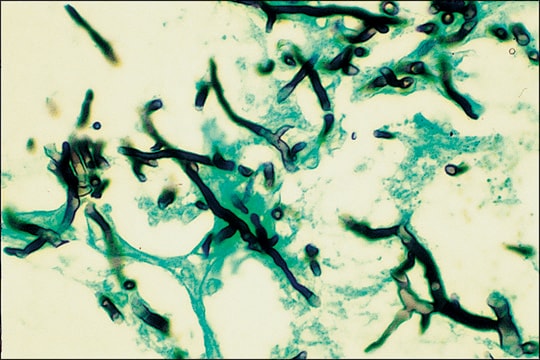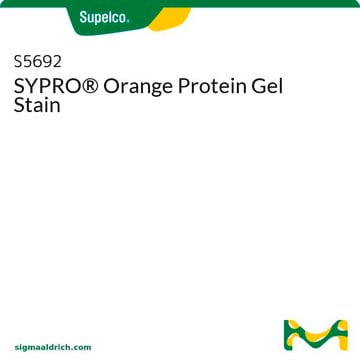PROTSIL2
ProteoSilver™ Plus Silver Stain Kit
Synonym(s):
protein stain, silver stain
About This Item
Recommended Products
usage
kit sufficient for 25 mini-gels (10 × 10 cm)
technique(s)
protein staining: suitable
storage temp.
20-25°C
General description
ProteoSilver Plus is also MALDI-MS compatible and does not contain glutaraldehyde, which crosslinks lysine residues, resulting in inaccurate spectra. ProteoSilver Plus Silver Stain Kit contains two additional reagents for destaining an excised protein spot, for those wishing to perform further characterization through tryptic digestion and MALDI-MS analysis.
Application
Features and Benefits
- Premixed and preweighed solutions reduce time and cost of purchasing and preparing individual components
- Optimized protocols help establish conditions for best results
- High sensitivity and low background ensure very low abundance proteins can be detected and resolved from other proteins
- MALDI Compatible - Protein spots of interest can be further characterized by mass spectrometry
- Room Temperature Stability allows easy and convenient storage
Legal Information
Signal Word
Danger
Hazard Statements
Precautionary Statements
Hazard Classifications
Acute Tox. 2 Inhalation - Acute Tox. 3 Dermal - Acute Tox. 3 Oral - Aquatic Acute 1 - Aquatic Chronic 1 - Carc. 1B - Eye Dam. 1 - Met. Corr. 1 - Muta. 2 - Repr. 1B - Skin Corr. 1A - Skin Sens. 1 - STOT SE 2 - STOT SE 3
Target Organs
Eyes,Central nervous system, Respiratory system
Storage Class Code
6.1A - Combustible acute toxic Cat. 1 and 2 / very toxic hazardous materials
WGK
WGK 3
Flash Point(F)
149.0 °F - closed cup
Flash Point(C)
65 °C - closed cup
Certificates of Analysis (COA)
Search for Certificates of Analysis (COA) by entering the products Lot/Batch Number. Lot and Batch Numbers can be found on a product’s label following the words ‘Lot’ or ‘Batch’.
Already Own This Product?
Find documentation for the products that you have recently purchased in the Document Library.
Customers Also Viewed
Our team of scientists has experience in all areas of research including Life Science, Material Science, Chemical Synthesis, Chromatography, Analytical and many others.
Contact Technical Service












